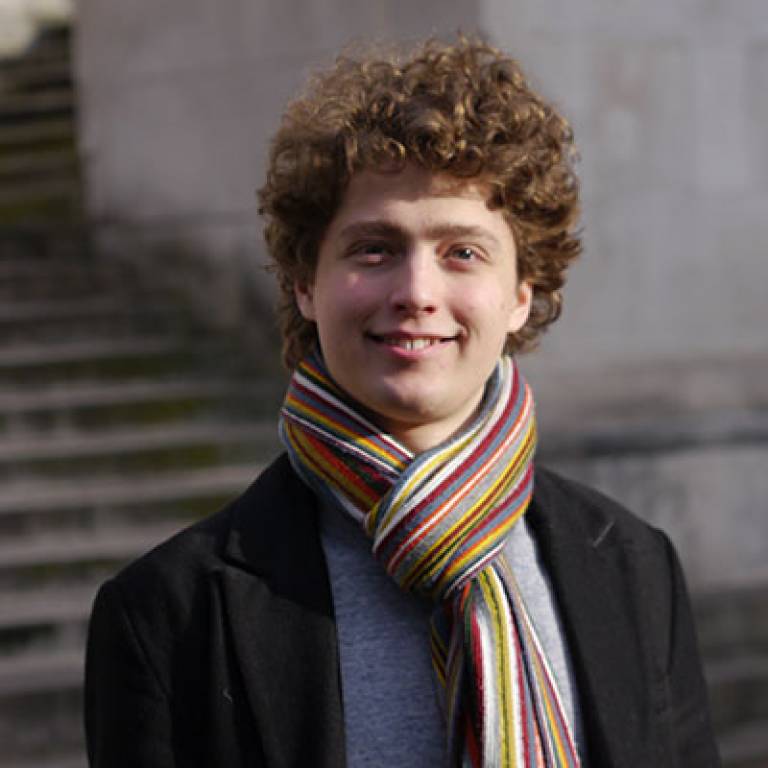Seven questions with Jakub Zalesak
9 March 2018
This week, we speak to second year Physics student Jakub Zalesak from Czechia who has been on the Global Citizenship Programme and got a place on the Laidlaw Research and Leadership Programme last year.

1. Why you are interested in this subject and what do you plan to do in the future?
Two things that drive me forward are the urge to create and the desire to understand. My Laidlaw project allows me to do both - understand the complex system of a radar signal-generator and create a tangible, physical device, by which we can image layers of ice and see how humans impact our planet.
2. What is the most interesting thing you've done, seen or got involved with while at UCL?
In my first year, I saw some posters for the Laidlaw Research and Leadership Programme and decided to apply. It's been an amazing experience so far - spending six weeks in the summer on a research project (and getting funding to help me do that) and leadership training. One of the most interesting aspects has been talking to people in the radar group about their work. Not only are they very passionate about their research, they are interested in what I am doing too. I was immediately accepted as a part of their "postgraduate" team and approached as if I were one, too.
It was really challenging as I had little experience in the field. I was often in a situation where I was unaware of how much I did not know. Every time I was able to complete another part of my circuit, however, it was very rewarding. It allowed me to learn a vast variety of things in a very short space of time.
I believe that I have not only learned a lot on the engineering side, but also benefited from working with a supervisor. In addition, I must say that the leadership training, which takes part during the rest of the year, has already proved useful in many areas of my life. Overall, I think it is one of the best research experiences UCL provides.
As part of the Laidlaw Scholarship, I also took part in the Global Citizenship Programme - I did the UnUrban strand, where we learned about modern approaches to urbanism and its impact on the people of the city. We then went to a community centre in Bromley-By-Bow and helped the local researchers figure out methods of surveying the present people without disrupting the spirit of the place. It was a great opportunity to practice the leadership skills learned at the Laidlaw workshops and to work on real-life solutions with people who cared about our work.
3. Have you discovered any 'hidden gems' during your time at UCL?
Definitely! The best one is probably the approachability of professors - it may seem very intimidating, especially in your first year. But if you give it a go, you realise that most professors are very approachable and genuinely interested in your questions. Even if they don't know the answer (sometimes nobody knows!), they will be able to point you in the right direction and help you out. This is especially true if it has something to do with their research!
4. Give us your top three things to do/see/go to in London
1. Get a bike and cycle along the Regent's canal - it offers a fascinating, picturesque side of London which you might miss. It has been a part of the city long before plans for the London Eye were ever conceived. If you get the chance, stop at the Gasholder park - it is a serene, enchanting place, especially when if you're lucky enough to see the moon through the imposing structure of the disused gas holder.
2. I would recommend going to see an opera from the UCOpera society. Given how cheap the student tickets are, it is a great opportunity to be amazed by something you might not otherwise consider visiting.
3. Toast some crumpets with butter or maple syrup! They're as British as it gets and quite delicious.
5. If you were Provost for the day, what one thing would you do?
I would go and have lunch in the canteen with students and then tea with professors in the tea room in the cloisters. I would like to honestly hear how they view their experience, compare it to what I know (as Provost) and share a bit of my perspective.
6. Who inspires you and why?
I was fortunate to have had a great number of inspiring teachers and professors so far. One that springs to mind is my high school teacher of French - he saw teaching as his mission and he always strived to enable every student in his class to learn French. He put his heart into what he did, always enthusiastic, always striving to be better.
7. What would it surprise people to know about you?
People might be surprised that apart from my interest in science, I also mentor debating at primary and secondary schools in London. I believe that the skills debating can teach you are just as relevant in science as in law, if not more so. If you look at Einstein or Crick, they were both not only great scientists, but also great science communicators.
 Close
Close

